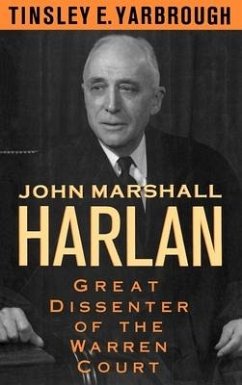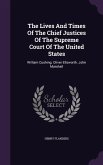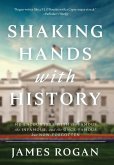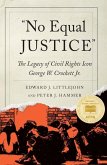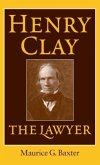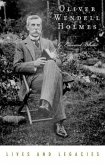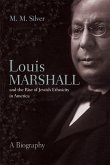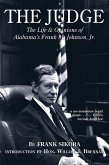John Marshall Harlan served on the Supreme Court from 1955 until his retirement and death in 1971. An articulate and forceful critic of the expansive civil liberties doctrines and constitutional trends of the period, Harlan is considered one of the most scholarly jurists ever to have served on the Supreme Court. This is the first book-length biography and analysis of his judicial and constitutional philosophy.
When David Souter was nominated by President Bush to the Supreme Court, he cited John Marshall Harlan as his model. It was an interesting choice. Admired by conservatives and deeply respected by his liberal brethren, Harlan was a man, as Justice William Brennan lamented, whose "massive scholarship" has never been fully recognized. In addition, he was the second Harlan to sit on the Court, following his grandfather--also named John Marshall Harlan. But while his grandfather was an outspoken supporter of reconstruction on a conservative court, the younger Harlan emerged as a critic of the Warren Court's liberal expansion of civil liberties. Now, in the first biography of this important but neglected jurist, Tinsley Yarbrough provides a detailed account of Harlan's life, from his privileged childhood to his retirement and death. Yarbrough examines the forces and events which shaped the Justice's jurisprudence--his early life and often complex family relationships, education at Princeton and Oxford, his work as a prosecutor during Prohibition, Republican Party activities, wartime service in the Army Air Force, and years as one of the nation's preeminent corporate lawyers (a career culminating in his defense of the du Pont brothers in the massive DuPont-GM antitrust suit). The book focuses, however, on Harlan's years on the high bench. Yarbrough weaves together discussions of the Justice's relations with his brethren, clerks, and staff, an examination of Harlan's role in the decision-making process on the Court, and an analysis of his jurisprudence. The Justice's approach to constitutional interpretation exalted precedent, deference to governmental power, and narrowdecisions closely tied to case facts; but he also accepted an evolving, creative model of constitutional construction which permitted expansive readings of constitutional rights. Yarbrough's details Harlan's close relationship with Justice Frankfurter, showing how--despite the
When David Souter was nominated by President Bush to the Supreme Court, he cited John Marshall Harlan as his model. It was an interesting choice. Admired by conservatives and deeply respected by his liberal brethren, Harlan was a man, as Justice William Brennan lamented, whose "massive scholarship" has never been fully recognized. In addition, he was the second Harlan to sit on the Court, following his grandfather--also named John Marshall Harlan. But while his grandfather was an outspoken supporter of reconstruction on a conservative court, the younger Harlan emerged as a critic of the Warren Court's liberal expansion of civil liberties. Now, in the first biography of this important but neglected jurist, Tinsley Yarbrough provides a detailed account of Harlan's life, from his privileged childhood to his retirement and death. Yarbrough examines the forces and events which shaped the Justice's jurisprudence--his early life and often complex family relationships, education at Princeton and Oxford, his work as a prosecutor during Prohibition, Republican Party activities, wartime service in the Army Air Force, and years as one of the nation's preeminent corporate lawyers (a career culminating in his defense of the du Pont brothers in the massive DuPont-GM antitrust suit). The book focuses, however, on Harlan's years on the high bench. Yarbrough weaves together discussions of the Justice's relations with his brethren, clerks, and staff, an examination of Harlan's role in the decision-making process on the Court, and an analysis of his jurisprudence. The Justice's approach to constitutional interpretation exalted precedent, deference to governmental power, and narrowdecisions closely tied to case facts; but he also accepted an evolving, creative model of constitutional construction which permitted expansive readings of constitutional rights. Yarbrough's details Harlan's close relationship with Justice Frankfurter, showing how--despite the

